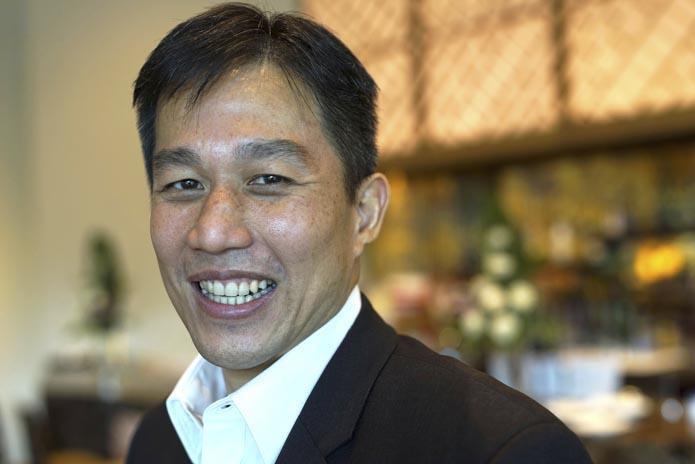
Lester Tan, managing director of APB ABC brewery. (Aung Htin Aung / Frontier)
Dutch brewer Heineken has entered Myanmar’s increasingly competitive beer market, opening a US$60 million brewery in a joint venture with a domestic partner at Hmawbi, about 30 miles north of Yangon. Lester Tan, the managing director of the APB ABC joint venture, spoke to Frontier about the company’s plans for Myanmar and its strategy for challenging Myanmar Beer’s dominant share of the market.
Tell us about Heineken’s plans in Myanmar.
Well, the local partner is a company called Alliance Brewery Company. It’s a small company that was set up for this partnership. The owner is Aung Moe Kyaw, who is the owner of International Beverages Trading Company [IBTC].
We came here in 1995 but because of the sanctions, pulled out a year later, although we were here long enough to build a brewery, which is the one Myanmar Brewery is using now.
We are here with two brands. There’s the Heineken brand and the other will be a local brand that we have created for the Myanmar market, called Regal Seven.
Support more independent journalism like this. Sign up to be a Frontier member.
Regal Seven is a mass appeal brand. It’s a friendlier price point as well, slightly more affordable. The Heineken brand is a premium brand.
We expect to see Regal Seven in the market in August, but Heineken will take a little longer. The approval process is a little bit more stringent and everything needs to be sent to Amsterdam for testing.
What will be your strategy for tapping into Myanmar Beer’s dominant market share?
It’s not going to be easy. Myanmar Beer is the number one, but there are other competitors, such as Dagon, Mandalay and Carlsberg has just opened up. So like any other competitive beer market, there is a strategy.
Obviously the few key pillars to the strategy are the fact that the Heineken company is a portfolio company. It’s a tiny one to begin, with two brands to start off with, but it will grow as the market grows.
Another pillar is quality. That’s the Heineken quality that we pride ourselves on.
Lastly it’s the people that we have that drive the plans that make the plans come to life.
Will most of the raw materials you need be sourced domestically or imported?
For us it’s not a matter of local or foreign, it’s about meeting the standards for quality. At the moment, the bulk of our products will be imported, but we are working with local suppliers to improve the quality of the products so that we can start using them.
Our goal is always to go as local as we can. We are here and we need to support the local economy. So Regal Seven will use local rice and we are working with rice farmers as we want to move them away from subsistence farming to contract farming.
So it improves the livelihoods and it improves the reliability of sourcing and the tracking of sourcing; it’s win-win for both sides.
We also work with rice millers on storage, transportation and improving the quality of rice. We will try to develop them to meet our standards. We won’t go to them and say ‘this is how you do things’; figure it out, we need to work with them.
We’re also working with a local carton supplier for our cardboard boxes. Again, the Heineken standards a little bit higher than they can meet at the moment in terms of quality, but we are working with them.
Are there any unique challenges to operating in Myanmar?
I think like in all developing countries there are challenges. Myanmar tends to have an extremely bureaucratic system in place and I know they are trying to improve that, but if you don’t know all the hurdles that you need to cross, it can be a tangled mess to get the approvals. But we are lucky to find a local partner who knows the business and knows exactly what steps to make. I think having a knowledgeable local partner is key.
Infrastructure overall is a huge one. I know the roads will be an issue; power is an issue. We do have backup power at the brewery but obviously not enough to run at a high-level.
Another is connectivity. For us as an international company, we need to be connected to HQ to send reports and things, and with poor connectivity it’s an issue.
As a beer maker, do you have responsibilities concerning health and addiction?
For us, it’s not so much the addiction part. We believe that beer can be part of a regular healthy lifestyle, as long as it’s enjoyed in moderation. The part that we focus on is more safety-related to beer. Right now our focus is very much on road safety, which is an issue in the country.
Are you referring to driving while drunk?
Yes. We have run a national road safety campaign together with the government, so our effort goes towards that. We have the standard messages as in not encouraging underage drinking [the legal drinking age in Myanmar is 18] and drinking while pregnant. We try to be responsible to not show models that look below 21, or showing someone behind the steering wheel.
Myanmar has one of the world’s lowest beer consumption rates. What are the implications of that?
Again, in a country like this statistics are hard to come by, but it’s probably between 3 and 6 litres per head, which is at the low end of the scale. It will change as the beer market grows. That will come with growth, so it’s not a deliberate strategy [to increase it], but is a nice effect of growth.



